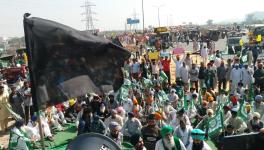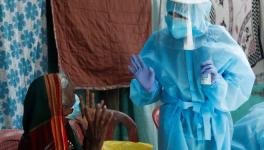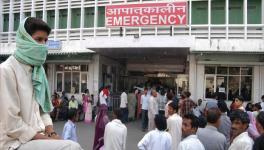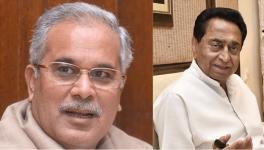Activists Demand Right to Health Act for Puducherry
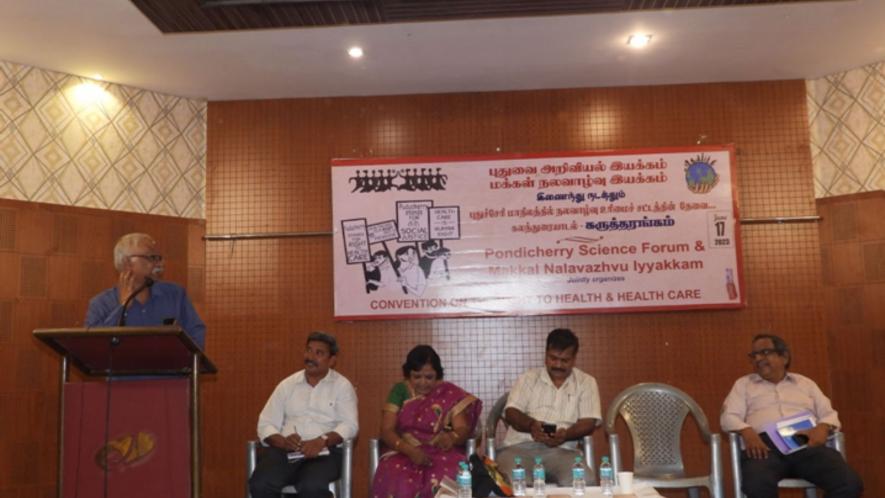
Tamil Nadu State Planning Commission member Dr J Amalorpavendan addresses a convention in Puducherry that demanded a right to health law. Image courtesy: Anand Astell.
Puducherry has several hospitals, including the Jawaharlal Institute of Postgraduate Medical Education & Research and the Indira Gandhi Government General Hospital & Post Graduate Institute and seven private hospitals,for its small population of nine lakh.
According to the 2021 NITI Aayog report,the Union Territory has the highest average of 222 functional hospital beds per one lakh population.
Despite so many hospitals, an ICMR study shows that around 26.3% of Puducherry’s population has diabetes.
To highlight the anomaly, the Puducherry Science Forum (PSF) and the People’s Health Movement-India-affiliated NGO Makkal Nalavazhvu Iyakkam (MNI) organised a convention on June 17 demanding a law guaranteeing the right to health.
“Only 20%-30% of Puducherry’s populationis in good health. Besides being the diabetes capital of India, the number of people in Puducherry with high blood pressure is three times that of diabetes patients,” said Dr J Amalorpavendan, a member of the Tamil Nadu State Planning Commission.
He pointed out that Puducherry has 800 bars but not as many nutrition centres. Alcohol is sold even along highways, and the ratio of road accidents to accidental deaths is high for such a small population. In the past six years, 1,044 people died and 7,164 were injured in road accidents.
“The right to healthcare is only one aspect.Building a scientific temper is the most important need. Otherwise, we would not have instances of faeces mixed with drinking water,” he added.
The organisers noted that Rajasthan implemented the Right to Health Care Act in March and Tamil Nadu is draftinga Right to Health Bill.
PSF memberDr Sundararaman said, “India is bound to implement such an Act. India has signed and promised the International Covenant on Economic, Social and Cultural Rightsto form such a law. We are not demanding free healthcare. Studies show that good healthcare leads to economic growth.”
Puducherry has the “human resource, capital and other resources for such a law though fund allocation, creating new human resources and reallocating work for government employees could behurdles”, he added.
MNI member D Suresh said the right to good health should includesufficient income, good environment and nutritious food. “Medical facilities are only 20%-30% part of health care. More than 70% is decided by social conditions.”
STRENGHEN HEALTH CENTRES
The convention also demanded one joint health centre and a health assistant for every 5,000 people, one ASHA for every 2,000 people and one primary health centre for every 30,000 people.
The convention proposed a model based on tuberculosis treatment, medicines for all diseases, such as diabetes and high blood pressure, at local health centres. Although state and Central hospitals provide medication, accessing them is“tedious due to travelling, standing in long queues and losing wages in the process”.
The health centres should ensure that enrolled patients regularly collect prescribed medication, the members said. In case of a lapse, the health worker must followup with the patient.
One of the participants proposed that health centres should be set up in common areas where people of all communities can access them.
Additionally, public pharmacies should ensure adequate stock of prescribed medicines. The participants unanimously resolved to make it mandatory for doctors to prescribe generic names and not brand names.
OCCUPATIONAL HEALTH SCREENING
The convention reiterated the need for health screening to prevent occupational health hazards.
“Women in private firms work for more than 12 hours without sufficient rest. They need to be scanned for breastcancer,” said breast cancer survivor and science activist Mohana Somasundaram.
The audience suggested that special attention should be given to sanitary workers, paid menstrual leaves and labour rights for health workers in private hospitals.
Speaking on behalf of unorganised workers, K Mohanasundaram said, “Bring unorganised workers under ESI and PF benefits. Rs 1 lakh crore is pending in the Central ESI funds.Only construction workers have a welfare board in Puducherry; other unorganised workers only have a society. There should be a board for all others, including sanitation workers.”
CHILDREN’S HEALTH
Placing the resolution on students healthcare, R Subhashini of Palli Kalvi Padhugappu Iyakkam (Movement to Protect School Education) said there should be one nurse to provide firstaid and one ambulance in every school with more than 500 students.
She also said that the nutritional value of the food provided through the nutritional health scheme must be assessed from time to time, students should be made aware of sexual harassment and sanitary napkins should be available in every school.
“It is absurd that children are punished for drugs and alcohol use.They should be rehabilitated” she added.
“Poor condition of toilets in schools leads to UTI among female students. Schools should ensure clean toilets,” she said.
A resolution on digital right and health was placed by G Ragulkanth, of Free Software Hardware Movement, Puducherry. “Data collected by ASHAs should be made anonymous and accessible via an open source.”
In total, 15 resolutions were placed, discussed and passed in the convention,where representatives of more than 20 health and civil society organisations were members.
Get the latest reports & analysis with people's perspective on Protests, movements & deep analytical videos, discussions of the current affairs in your Telegram app. Subscribe to NewsClick's Telegram channel & get Real-Time updates on stories, as they get published on our website.











